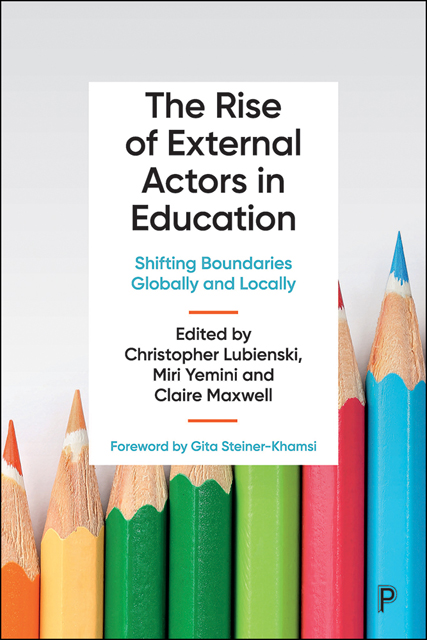Book contents
- Frontmatter
- Contents
- List of figures and tables
- Notes on contributors
- Foreword
- Introduction
- 1 Collective parental involvement: an in-between actor
- 2 When teachers become the external actor: private tutoring and endogenous privatisation in Cambodia
- 3 Cross-sectoral alliances in charter schools: the role of boards of directors from for-profit and non-profit sectors
- 4 A communitarian framework for understanding the relations between schools and NGOs
- 5 PISA for sale? Creating profitable policy spaces through the OECD’s PISA for Schools
- 6 Historical reconfigurations of internal/external actors in Danish educational testing practices
- 7 A short history of external agency involvement within education in contemporary Poland
- 8 New philanthropy in the heterarchical governance of education in Brazil
- 9 Venture philanthropy and the rise of external actors in Australian education
- 10 Power struggle in education policy change: the role of knowledge actors in structural reforms in Chile
- Conclusion: Complexity and intentionality of external actors in education
- Index
Conclusion: Complexity and intentionality of external actors in education
Published online by Cambridge University Press: 13 October 2022
- Frontmatter
- Contents
- List of figures and tables
- Notes on contributors
- Foreword
- Introduction
- 1 Collective parental involvement: an in-between actor
- 2 When teachers become the external actor: private tutoring and endogenous privatisation in Cambodia
- 3 Cross-sectoral alliances in charter schools: the role of boards of directors from for-profit and non-profit sectors
- 4 A communitarian framework for understanding the relations between schools and NGOs
- 5 PISA for sale? Creating profitable policy spaces through the OECD’s PISA for Schools
- 6 Historical reconfigurations of internal/external actors in Danish educational testing practices
- 7 A short history of external agency involvement within education in contemporary Poland
- 8 New philanthropy in the heterarchical governance of education in Brazil
- 9 Venture philanthropy and the rise of external actors in Australian education
- 10 Power struggle in education policy change: the role of knowledge actors in structural reforms in Chile
- Conclusion: Complexity and intentionality of external actors in education
- Index
Summary
Education policy has witnessed a series of trends in recent decades at the global level, including: efforts to expand education for all; the rise of lowcost options, often facilitated by technological innovation; and the growing influence of private corporations, NGOs, and the ‘effective philanthropy’ movement. But an overriding shift that ties many of these disparate trends together is the elevation of forces external to established education systems. Across the globe, external actors, many of which are analysed in this volume, have enjoyed growing influence in education at different levels and in vastly different contexts.
Certainly, there are reasons that policymakers have become enamoured with the idea of creating the conditions in which these external forces have seen their ascendancy. Since the late 1970s, policymakers around the globe and of different ideological stripes have embraced the neoliberal critique of state-administered enterprises. Based largely on popular perceptions of inefficient, ineffective, and even corrupt government bureaucracies, theorists shaped a ‘climate of opinion’ privileging policy agendas that sought to roll back the state whenever possible in favour of non-state actors (Cohen & Garet, 1975). The question quite often was not if this should be done, but instead revolved around how much was possible as far as turning state enterprises, functions, and responsibilities over to actors external to traditional modes of governance. More strident voices such as market fundamentalists and public choice theorists found common cause with more equity-minded reformers, community organisers, well-meaning philanthropists, and liberals and leftists in noting the failures of the state to deliver high-quality education for all. Theorists in particular diagnosed examples of ‘state failure’ as being due to inefficiencies and perverse incentives inherent in bureaucratic control (West, 1970, 1982; Allen, 1997; Tullock et al, 2002).
Of course, external actors represent an obvious remedy to these diagnoses. Unencumbered by state bureaucracies and regulations, and often free of collective bargaining constraints, private actors from for-profit and non-profit sectors present state and non-state investors with appealing opportunities to improve education services. Of course, such efforts often reconfigure traditional boundaries between state and non-state sectors, as private interests take a larger or even a leading role in governance and provision of education services traditionally offered by the state.
- Type
- Chapter
- Information
- The Rise of External Actors in EducationShifting Boundaries Globally and Locally, pp. 212 - 219Publisher: Bristol University PressPrint publication year: 2022



